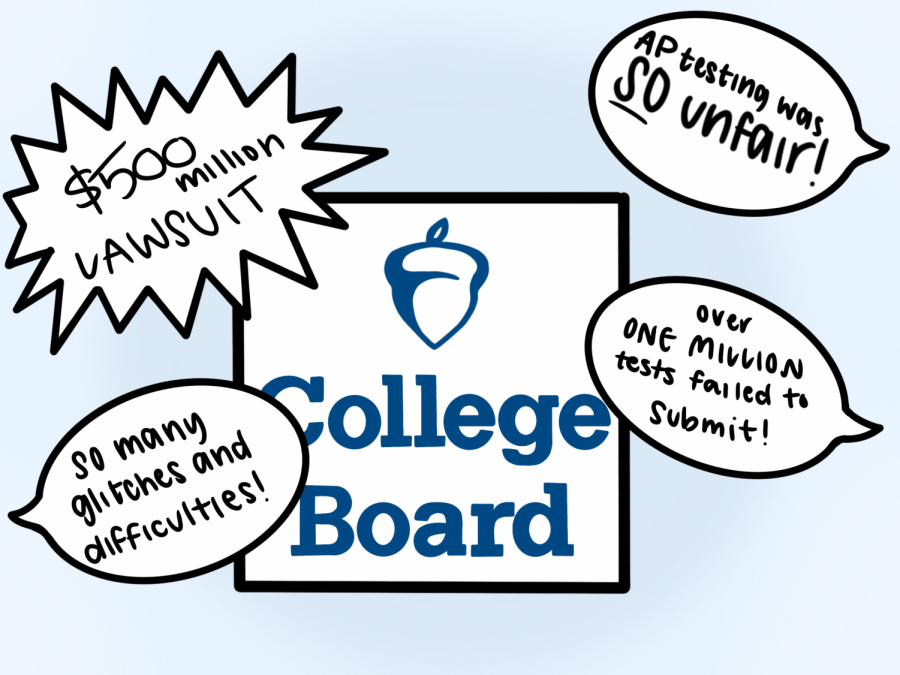OPINION: The College Board lawsuit is a hopeful step towards change
Many students have complained about difficulties regarding the College Board’s AP exam submission process.
News broke on Wednesday, March 20, that the College Board will be facing a $500 million lawsuit from FairTest on behalf of angry parents and students due to submission complications during the online Advanced Placement exams. While bewildering, this lawsuit was inevitable and has addressed some concerns that have plagued these tests in past years.
Shortly after the California shelter-in-place order was made in late March, the College Board surveyed AP students nationwide to assess whether or not they were still interested in taking the AP exams. An astounding 91 percent of students were in favor despite the ongoing COVID-19 pandemic. As a result, the College Board developed and administered online AP Exams from May 11-22, and allowed a makeup testing option in June.
The plaintiff FairTest suggests that the College Board had engaged in a list of illegal actions, which ultimately led to a breach of their contract. The College Board responded to this by defaming these claims as non-factual, baseless complaints. The College Board defended themselves using two main arguments. First, the College Board said students were advised to ensure they had the most current browser to allow submissions to run smoothly. Second, they claimed that students’ failure to watch the countdown timer provided in the exam portal ultimately led to their own failed submission.
These claims outraged students and parents, who saw it as an attempt by the College Board to scapegoat students. Students across the country have spoken out, claiming that their submissions failed despite watching the timer and taking the test on an up-to-date browser. Countless attempts to submit failed as the time dwindled and left these students infuriated as their hard work had been wasted.
Prior to the release of the online AP Exams, the College Board received many concerns from not only families but also educators and counselors. Plaintiffs had complained: “the at-home AP exams would not be fair to students who have no computer, reliable access to the internet or quiet workspaces from which to work, or to under resourced students in general.” These concerns grew even as the exams began. Questions about availability and applicability of legally acquired accommodations for students with disabilities, the fair access to connectivity for all students, test security and score comparability had remained unanswered by the College Board even when exams were over.
FairTest says that the College Board rushed these “untested” computerized exams into the marketplace for their own selfish benefit and annual revenue. Their bold claim that they were untested, sent many students into panic. More than one million students failed to submit their tests, meaning that in June over one million retakes will occur.
Though still unproven whether these tests were examined prior to their piloting, during the first week of exams, they were proven to experience glitches. It wasn’t until the technical glitch made it impossible for thousands of students to submit their tests that the College Board stepped in and provided a backup option for students to submit their tests if their browser failed. Thus, during the second week of testing, students who encountered errors were able to send their responses via a provided email address immediately after finishing their browser-based AP exams.
Initially, it seemed like only one percent of test takers had failed to submit, but the rising number of complaints have revealed it to be upwards of five percent and possibly up to 20 in total. Despite this new revelation, it is likely that the College Board will stick to their claim concerning students’ overwhelming response to not cancel the test despite becoming computerized. By claiming that students were eager to take the exams despite the pandemic, the College Board deflected responsibility, as there were bound to be issues with the online exam.
The College Board has been administering the SAT and AP exams for years now. Holding them accountable brings the bigger issues of American education to light. The College Board’s monopolistic role in high schoolers’ exam-taking experiences and, consequently, their access to higher education has long been controversial. This lawsuit is nothing short of monumental and will hopefully enact change.


